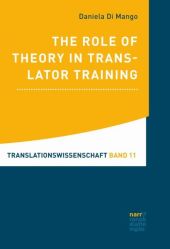 Neuerscheinungen 2018Stand: 2020-02-01 |
Schnellsuche
ISBN/Stichwort/Autor
|
Herderstraße 10
10625 Berlin
Tel.: 030 315 714 16
Fax 030 315 714 14
info@buchspektrum.de |

Daniela Di Mango
The Role of Theory in Translator Training
1. Auflage. 2018. 440 S. 220 mm
Verlag/Jahr: NARR 2018
ISBN: 3-8233-8161-X (382338161X)
Neue ISBN: 978-3-8233-8161-7 (9783823381617)
Preis und Lieferzeit: Bitte klicken
Translation study programs have always been torn between the expectations placed on them to provide students with a comprehensive education at an academic level but at the same time to prepare them for the demands of the professional translation market. There is, furthermore, an ongoing debate about a supposed gap between translation theory and practice. Several, often opposing claims have been put forward concerning the usefulness of theory to professionals and students and how and when to best implement theoretical courses in translation curricula. The aim of this book is to provide an overview of the different opinions and expectations that have been put forward in the literature and to test some of these claims empirically on student subjects who have been trained with either a practical or a theoretical focus on translation. It thus gives insights into the role of both theoretical and practical aspects in translator training and the ways in which each of them can contribute to the development of translation competence.
1 Introduction
1.1 Training Translators the Academic and the Vocational
1.2 Aims of the Study and Methodological Approach
1.3 Outline of Chapters
2 Translation Competence
2.1 Translation: A Functional Approach
2.2 Translation Competence Defined
2.3 The Content of Translation Competence
2.4 The Acquisition of Translation Competence
2.5 The Nature of Translation Competence
2.6 Adopting a theoretical framework
3 Investigating Translation Competence
3.1 Self-concept and Concept of Translation
3.2 The Translation Process
3.3 The Translation Product
3.4 Summary
4 The Impact of Teaching Translation Theory
4.1 The Role of Translation Theory
4.2 Theoretical Reflections on the Impact of Theory
4.3 Students and Practitioners Opinion on Theory
4.4 Teaching Translation Theory
4.5 Research Questions and Working Hypotheses
4.6 Summary
5 Study Design
5.1 Selection of Subjects
5.2 Experimental Design
5.3 Methods of Data Collection
5.4 Variables
5.5 Summary and Critical Evaluation of Study Design
6 Translators Self-concept
6.1 Indicators Related to the Self-Concept
6.2 Findings
6.3 Discussion of Findings
6.4 Summary
7 The Product Evaluation through Error Analysis
7.1 Evaluating translations
7.2 Error Marking Criteria
7.3 Indicators Related to Errors
7.4 Findings
7.5 Discussion of Findings
7.6 Summary
8 The Process: Investigating Translation Problems
8.1 Transcription
8.2 Analyzing Individual Translation Problems (ITPs)
8.3 Analyzing Task-inherent Translation Problems (TTPs)
8.4 Summary
9 Subjective Opinion on Theory
9.1 Questions and Methodology
9.2 Findings
9.3 Discussion of Findings
9.4 Summary
10 Summary of Results and Conclusion
10.1 Overall Translation Competence - Bringing Together the Results
10.2 The Impact of Teaching Theory Answering the Research Questions
10.3 Implications for Translator Training
10.4 Limitations of the Study and Outlook
11 References
12 Annexes
Daniela Di Mango lehrt englische Sprachwissenschaft an der Universität Passau.


